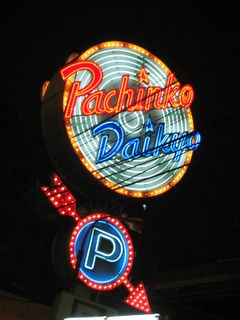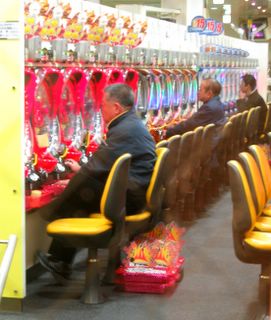a load of balls

Basically, pachinko is a load of balls. You have to get the balls into holes. A bit like snooker but without the cues, chalk, felt and referee.
In Osaka, pachinko parlours are almost as ubiquitous as the convenience store. A pachinko machine is a kind of glorified fruit machine, or slot machine or whatever you want to call it.
Inside a pachinko parlour, the first thing that strikes you is the cigarette smoke and the noise. To combat the noise, some people stick balls in their ears, which is rather gross when you think about all the holes those balls have been in before.
You'll find all walks of life in the pachinko parlour, from salarymen to housewives, children to small animals. It's not difficult to play pachinko. But it's difficult to play well. You control the speed of the balls' release by use of a dial, and proceed to watch it bounce around a bit, before seeing it disappear down one of the holes. That's pretty much it.
It's easy to lose a lot of money very quickly at pachinko (unless you're the owner, in which case it's easy to win a lot of money very quickly). Most people in a pachinko parlour are not smiling. They are there to forget about their job, wife, husband and, as a result of the pachinko, rapidly mounting debts.
If you play well, you win more balls, and more balls. These balls are pretty useless in everyday life (unless you need thousands of earplugs), but the clever thing is that you can exchange them for hard cash. Since it's illegal to win money in a pachinko parlour, they get round it by giving you tokens for balls. You then take your tokens outside the parlour to a small hut with a small window, where a small person will give you some yen, which you duly spend at the pachinko parlour the following day.

Some men playing with their balls.
On Thursday, 22 December, 2005, Anonymous said:
Anonymous said:
I've been fascinated by Japanese culture for a while now and have enjoyed reading your observations about life in Japan. I'm desperate to go one day, but in the meantime, I'll have to make do with Takashi Kitano films and reading Murakami.
Happy Christmas,
Mike (NotesfromN4)
On Saturday, 24 December, 2005, Anonymous said:
Anonymous said:
» Post a Comment